United States
Last week saw US equities slightly increasing in a low-volatility environment. Indeed, the S&P 500 closed 0.81% up from last week close, while the Nasdaq and the Dow Jones closed on Friday up 1.18% and 0.92% respectively from the previous week. The VIX index floated between 10.5 and 11.7 continuing to show the low volatility that American equities suffered since the beginning of 2017.
Trump’s political movements were once again on the spotlight.
On Wednesday, Donald Trump had a meeting with the top US airlines pledging he would help them compete with foreign carriers that are aided by their government like Emirates, Etihad, Qatar Air competition. As a result, the Dow Jones U.S. Airlines Index is up almost 3% on previous week close.
On Friday, the news that President Donald Trump plans to send Congress an outline for a plan to overhaul the tax code as early as the end of the month sent the three main US stock indexes at all-time highs. On the other hand, the news increased the inflation expectations and caused the yield on US 10y Treasuries to increase by almost 10 basis points to 2.41%.
Finally, on Friday met the Japanese PM Shinzo Abe following his recent comments about the exports-friendly yen devaluation. The lack of comments left the USD/JPY almost unchanges on the day, but the US Dollar appreciated 1.35% since Monday. The USD depreciated 1.34% against the Euro over the week with the EURUSD closing at 1.0642.
Eurozone
Two were the main concerns that affected the Eurozone markets this week: the upcoming French election and Greeks talks with creditors. However, markets responded well. European stocks ended the week higher as earnings results from major companies were announced. The Stoxx Europe 600 index, in particular, closed with a gain of 0.91%, thanks mainly to an unexpected expansion in the manufacturing PMI index for the Eurozone. The Italian FTSE MIB, however, suffered a loss of 1.33% due as usual to banks performance.
In the fixed-income market, the spread between both the French and Italian bonds and the German bunds ended its rally. In particular, the French one recovered some ground after a bad start of the week – with the spread at a 4-years high – after a scandal nearly halted the republican candidate race towards the election. As for the Greeks notes, signs of progress in talks with creditors (IMF and Europe) helped to keep the 10-year yield under 7.40%. The benchmark – the German bund – stays at 0.32%.
Because of these events, the Euro depreciates against the dollar by 1.33% and currently trades at 1.063.
Next week, the German CPI and EU industrial production will be announced on Tuesday, while on Wednesday the EU balance of trade for December will be revealed.
UK
Current bank rate set by BoE is at 0.25%, while core inflation rate stands at 1.6% well above expected inflation of 1.4%. Next decision regarding bank rate will be announced on 16 March.
FTSE 100 equity index increased almost 1% from 7188.3 to 7258.75 during the week, mostly pulled by oil companies BP and Royal Dutch Shell together with Glencore and mining sector. Gilt 10Y started the week with the yield of 1.36%, and ended it at 1.26%, decreasing 7.35%. GBP-USD exchange rate was flat, ending the week at 1.2491. GBP-EUR kicked off the week at 1.1598, increasing 1.2% during the week to end it at 1.1738. Manufacturing PMI stands at 55, slightly lower than in December but still representing strong economic health.
Further evidence appeared showing the strength of the economy since the Brexit vote, mainly driven by manufacturing and construction sectors. Also, trade balance improved as exports grew faster than imports in December. The National Institute of Economic and Social Research published that a growth was 0.7 per cent in the three months ending January, up from 0.6 per cent the previous quarter, which implies that 2016 annual growth rate was 4.3 per cent, the fastest in six years.
New car purchases and registrations rose to a 12-year high in January, even as surveys showed consumer confidence decreasing. Figures published by the Society of Motor Manufacturers and Traders showed that 174,564 new cars were registered in January, the fastest start to a year since 2005 and 2.9 per cent higher than in 2016.
On the other hand, despite a stream of positive economic data, business leaders say in a survey that Brexit already has negative effect on their business. They are worried because of Theresa May’s statement that she would prefer “no deal to a bad deal”.
Rest of the World
The Japanese stock-market stayed in a wait-and-see mood for the growing concerns about Friday’s meeting between Prime Minister Shinzo Abe and US President Donald Trump. As Japan has the second-largest trade surplus with the US of any individual country besides China, market participants feared Mr Trump might have criticized the BoJ’s drastic monetary policy, affecting the yen-dollar exchange rate. Nevertheless, the Nikkey 225 turned sharply higher on Friday helped by a stronger dollar, pushed by the rumors of Mr Trump to make a major tax announcement next week. The major Japanese equity index has recorded a weekly gain of 2.44%.
Mr Trump’s effect on international financial markets is still strong with Banxico raising the benchmark interest rates by 50 basis point to prevent a further peso devaluation. Since Trump’s victory, the Mexican central bank has raised interest rates three times even as the economy slows and confidence is weak.
The MSCI Emerging Markets index advanced 0.66% reaching five-month highs, helped by a strong performance of Chinese equities. In China sentiment was bearish on Wednesday when PBOC’s foreign exchange reserves fell below the psychological level of $3 trillion. Stocks climbed as this drop has been the smallest in the last seven months, signalling that tighter capital controls was taking effect.
WTI crude oil futures closed on Friday at $53.86 a barrel. Crude oil soared on Friday after report that OPEC members delivered more than 90% of the output cut they agreed on January meeting. Regarding other Asian equities, on Friday the MSCI Asia Pacific Index decreased by 80 basis points and Japan’s Topix index increased by 10 basis points.



0 Comments